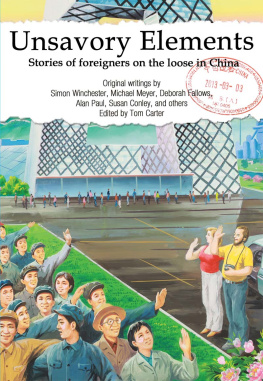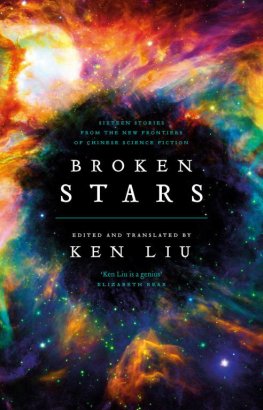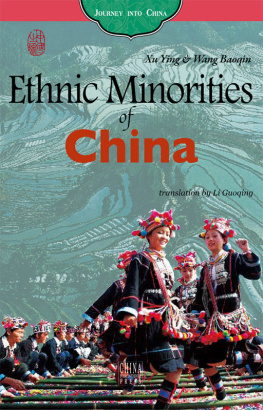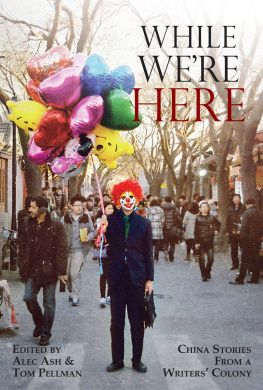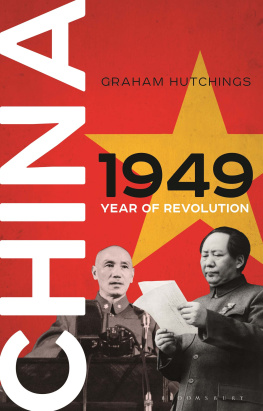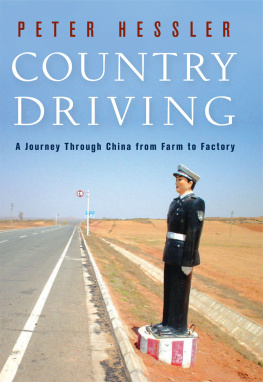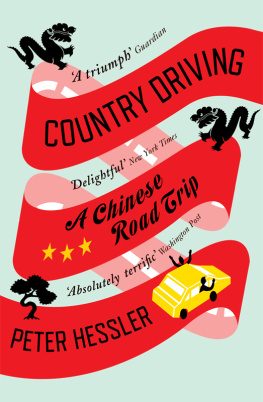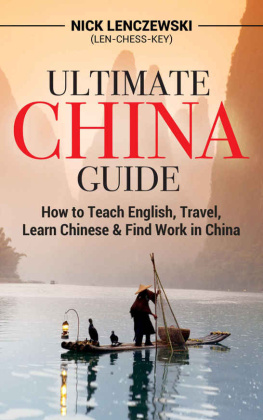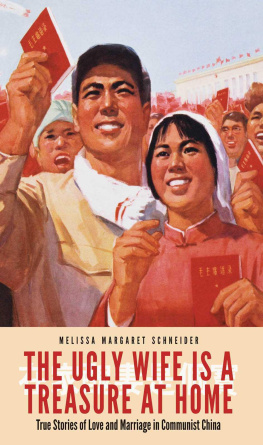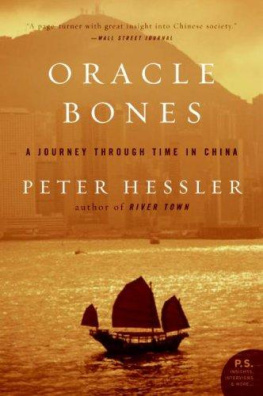Unsavory Elements, stories of foreigners on the loose in China
Edited by Tom Carter
ISBN: 978-988-16164-0-1
2013 Tom Carter and the contributors
View From a Bridge 2000 by Peter Hessler. Originally published in The New Yorker.
Reprinted with permission.
Cover artwork Nick Bonner, Koryo Studio & Dominic Johnson-Hill, Plastered T-shirts
C ONTENTS
Dedicated to the people of China, who have enriched our lives with these page-turning experiences.
I NTRODUCTION
I almost died in China. Only six months into my first year here I had my first big chance to become a statistic for the U.S. State Department thanks to encephalitis, a viral infection of the brain that can kill within seven days. The symptoms: everything many Westerners might expect the first time they come to China, including headache, fever, confusion, fatigue, nausea The doctors at the small-city hospital near where I lived were completely mystified until my mother, a veteran emergency room nurse back in the States, instructed them via telephone on how to diagnose and treat my illness.
Having a nice smile holstered and ready to quick-draw in China is always good for foreigners lost in translation, but my American sense of law and order has been less useful. Following a beating by three drunken men at a hotel in Chongqing that nearly knocked the teeth out of my smile, I reported my assailants to the local police. That didnt have quite the response Id hoped for; they kicked me out of the hotel at 4:00 a.m., because it was now deemed unsafe for foreigners.
Oh, and there was that one time when
The list of amazing, perplexing or ridiculous experiences for almost any foreigner in the Middle Kingdom goes on and on. Hence this book.
From the moment we step foot in the Middle Kingdom, foreigners are subjected to an extraordinary range of alien experiences, ranging from appalling to exquisite. We contend with seething masses of humanity, accosting stares and shouts from curious Chinese who have never before seen a foreigner and predatory scammers operating under the impression that all Westerners are rich, as well as the ability to befriend nearly any stranger on the street, the endless variety of Chinese cuisines and a sense of security that comes with being in a country with one of the lowest violent crime rates in the world.
A small but growing contingent of foreigners now call China home, and those who stick it out seem to actually enjoy flirting with fatality under smog-laden skies. And while Chinese emigrants continue to flee their motherland to chase the American Dream, Westerners are arriving in todays China in unprecedented numbers chasing their own dreams.
These foreigners are not always greeted with a welcoming bow. In recent years, as many Western economies have faltered, the collective esteem of Westerners in the eyes of some Chinese people has also fallen from the pinnacle of superstar status. On top of the 220-million-strong floating population of migrant laborers, China now also has to deal with over one million foreigners, many of whom are in effect economic refugees. Where we once held our heads high at the rather cool moniker foreign devils, we have in some cases been reduced to unsavory elements.
Change is the only constant in China. Yet, the more China changes, the more it stays the same, and our experiences as outsiders remain essentially timeless. Unsavory Elements was conceived from this concept. Whereas a Chinese host may ply you with endless glasses of machine-grade alcohol at a banquet, Unsavory Elements serves a multi-course feast of original writings commissioned expressly for this anthology. This book may fall under the genre of travel writing, but travel is just the beginning of the adventure here. These narratives are also about living, learning and loving in this land, about becoming intimate with Chinese culture. Their contributions contain the candidness of Old China Hands after several drinks at an expat bar, and a closeness usually only found when sharing a cramped hostel dormitory with other unwashed backpackers.
The cast of contributors range from Chinas most renowned Western writers and other outsiders living in China who have witnessed the nations dramatic development over recent decades to inveterate vagrants such as myself.
There is a big difference between being tourist and traveler, which Peter Hessler highlights as he tours the bleak border between China and North Korea, and Pete Spurrier who learned how to travel the hard way as a hobo stowed away on third-class trains from Urumqi to Hong Kong. Dominic Stevenson writes of a stint in a Shanghai prison, and Bruce Humes of being hospitalized after a brutal beating. But for every heart-breaking moment that China exacts on us, there is also a heart-warming one, such as Kay Bratts unconditional love for a disabled orphan, and Kaitlin Solimines relationship with her homestay Chinese mother.
Many of the authors featured in this anthology got their start as English teachers, including Matt Muller, who compares his career to descending the evolutionary ladder, and Michael Levy, who offers a glimpse into the unscrupulous side of the English teaching business. Indeed, foreigner business people abound in the new New China, like Graham Earnshaw who tells of guerrilla publishing, and Matthew Polly of losing his shirt while trying to sell shirts at Shaolin.
Unsavory Elements has its share of hilarious moments, including Derek Sandhaus baijiu-soaked banquet gone wrong. But some of the stories were not so funny when they were happening, such as Nury Vittachis experience of being strong-armed by scammers, and Rudy Kong in the middle of an ice-hockey brawl with the police. Alan Paul proves a humorous account of a family road trip across Sichuan where patience, an open mind and even more patience are a travelers most required traits.
Some Western families have settled in China to introduce their children to a new culture, as Aminta Arrington has done, admirably attempting to overcome Chinas self-imposed social divisions, and Susan Conley, as she and her children use street food as a savory medium to acclimatize. But on the other hand, Jocelyn Eikenburg talks of how, when it comes to love, interracial relationships dont have it easy against 5,000 years of tradition.
One of the best parts about living in China is the opportunity to mingle with the people, which Dan Washburn does during a visit with villagers in what he calls perhaps the poorest village in the poorest province in China. As every foreigner here knows, the affable Chinese have the tendency to make their foreign friends feel like superstars, but musician Jonathan Campbell also discovers that being a real rock star in China is not always as glamorous as it seems.
Some expats prefer the glam and glitz of Chinas cosmopolitan cities, on which Susie Gordon reflects during a neon-lit night out in Shanghai, whereas a hardened explorer like Jeff Fuchs prefers to spend his days trekking through the Himalayas of Tibet. Audra Ang witnesses a darker side of Chinas Tibetan population in Xiahe, and Jonathan Watts pays tribute to an expatriate environmentalist living in the jungles of Xishuangbanna.
China is often a place where the real tends to shade into the surreal, something to which Mark Kitto can attest as he relates how local officials decide to make a statue of him. Deborah Fallows, too, when she and her husband are coerced into writing a confession just for taking photos at Tiananmen Square.
Meanwhile, Mike Meyer muses that the rapid rise of modern Beijing has made it less a city than a drafting table, and my own observation of a young peasant prostitute who had trouble walking in her platform heels is probably an apt metaphor for a nation struggling to cope with its development.
Next page
